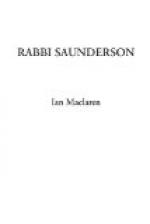The love of law diffused through the Presbytery became incarnate in the clerk, who was one of the most finished specimens of his class in the Scottish Kirk. His sedate appearance, bald, polished head, fringed with pure white hair, shrewd face, with neatly cut side whiskers, his suggestion of unerring accuracy and inexhaustible memory, his attitude for exposition—holding his glasses in his left hand and enforcing his decision with the little finger of the right hand—carried conviction even to the most disorderly. Ecclesiastical radicals, boiling over with new schemes, and boasting to admiring circles of MacWheeps that they would not be brow-beaten by red-tape officials, became ungrammatical before that firm gaze, and ended in abject surrender. Self-contained and self-sufficing, the clerk took no part in debate, save at critical moments to lay down the law, but wrote his minutes unmoved through torrents of speech on every subject, from the Sustentation Fund to the Union between England and Scotland, and even under the picturesque eloquence of foreign deputies, whose names he invariably requested should be handed to him, written legibly on a sheet of paper. On two occasions only he ceased from writing: when Dr. Dowbiggin discussed a method of procedure—then he watched him over his spectacles in hope of a nice point; or when some enthusiastic brother would urge the Presbytery to issue an injunction on the sin of Sabbath walking—then the clerk would abandon his pen in visible despair, and sitting sideways on his chair and supporting his head by that same little finger, would face the Presbytery with an expression of reverent curiosity on his face why the Almighty was pleased to create such a man. His preaching was distinguished for orderliness, and was much sought after for Fast days. It turned largely on the use of prepositions and the scope of conjunctions, so that the clerk could prove the doctrine of Vicarious Sacrifice from “for,” and Retribution from “as” in the Lord’s Prayer, emphasizing and confirming everything by that wonderful finger, which seemed to be designed by Providence for delicate distinctions, just as another man’s fist served for popular declamation. His pulpit masterpiece was a lecture on the Council of Jerusalem, in which its whole deliberations were reviewed by the rules of the Free Kirk Book of Procedure, and a searching and edifying discourse concluded with two lessons. First: That no ecclesiastical body can conduct its proceedings without officials. Second: That such men ought to be accepted as a special gift of Providence.
The general opinion among good people was that the clerk’s preaching was rather for upbuilding than arousing, but it is still remembered by the survivors of the old Presbytery that when MacWheep organized a conference on “The state of religion in our congregations,” and it was meandering in strange directions, the clerk, who utilised such seasons for the writing of letters, rose amid a keen revival of interest—it was supposed that he had detected an irregularity in the proceedings—and offered his contribution. It did not become him to boast, he said, but he had seen marvellous things in his day: under his unworthy ministry three beadles had been converted to Christianity, and this experience was so final that the conference immediately closed.




